Here’s how Muddy River News readers feel about abortion, one of top issues of this year’s election
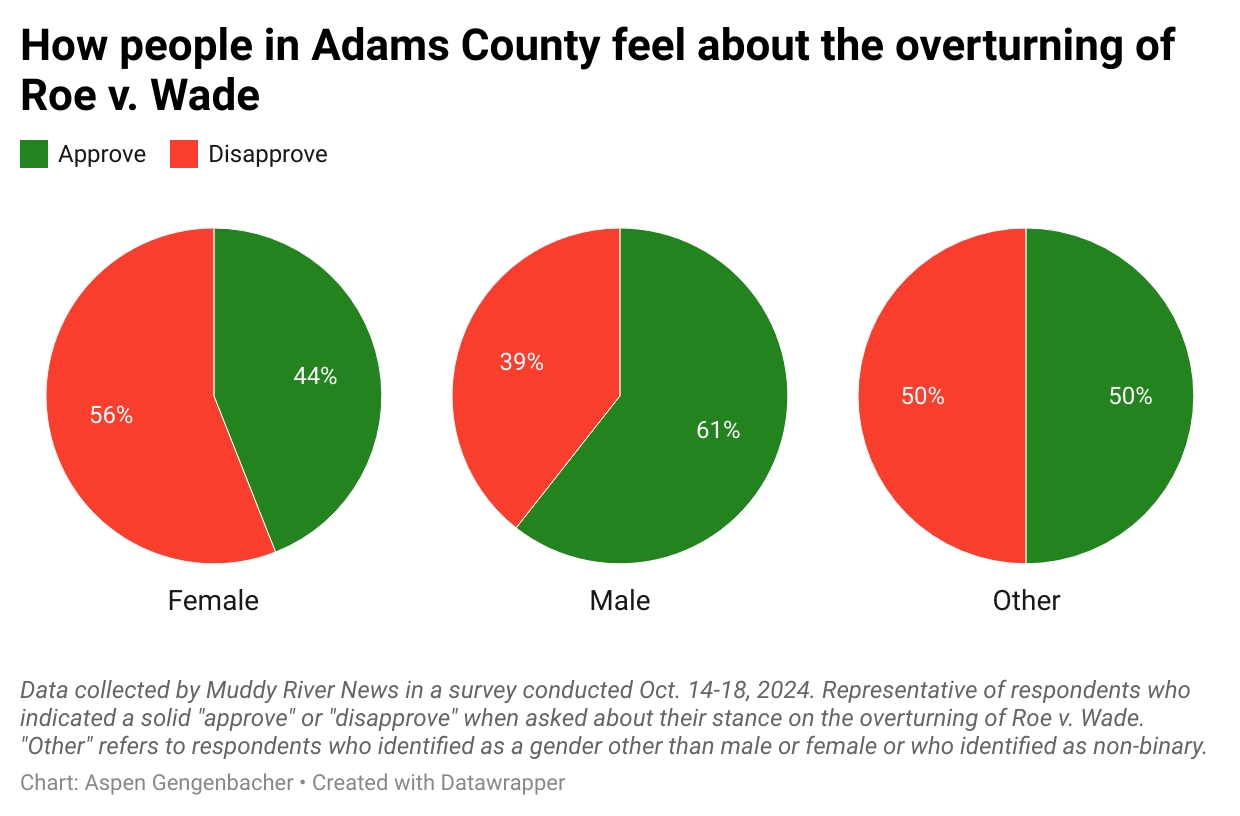
DISCLAIMER: Throughout this story, references are made to a survey Muddy River News conducted in October on abortion. It represents the opinions of MRN’s readers who completed the survey. It was not intended to be a scientific-based endeavor to provide a summary of the views on the topic as fully representative of Northeast Missouri and West-Central Illinois. It was open and available to all our readers from Oct. 14-18.
QUINCY — When asked about the day two planes flew into the Twin Towers in 2001, many Americans will provide a detailed description of where they were, who they were with and what they were doing.
When asked about the day the U.S. Supreme Court overturned Roe v. Wade in 2022, thus eliminating the Constitutional right to an abortion, many American women will provide an equally vivid description.
“I was dog-sitting when I found out,” said Ralls County resident Breahnna Parsons, one of more than 500 respondents to a recent Muddy River News poll. “I just sat there, just staring at my phone. I was like, ‘There’s no way. There’s genuinely no way that’s real.’”
Parsons was too young to vote in 2020, but she’ll be heading to the polls Tuesday for the first time. For her and many other women under 30, abortion is the top election issue, according to an Associated Press survey.
In the context of one of the closest presidential races in history, Muddy River News wanted to know how its readers felt about abortion. Could they find common ground? The answers to those questions seemed to mirror those nationally — not necessarily in terms of sentiment but on something else.
It’s complicated.
A top issue for voters, a liability for politicians
Vice President Kamala Harris has said she promises to restore reproductive rights in the country if elected, an unsurprising stance for a candidate who has championed abortion access throughout her career.
Former President Donald Trump’s stance on the issue is a bit trickier to pin down. Appointing “pro-life” judges to the Supreme Court was a pillar of his 2016 campaign, which he succeeded in with the appointments of Justice Neil Gorsuch, Justice Brett Kavanaugh and Justice Amy Coney Barrett, who all voted to overturn Roe v. Wade.
“After 50 years of failure, with nobody coming even close, I was able to kill Roe v. Wade, much to the ‘shock’ of everyone … Without me the pro Life movement would have just kept losing. Thank you President TRUMP!!!” Trump wrote on his platform Truth Social last year.
Trump was right. No one even came close, and it was indeed a shock to many Americans.
Overturning Roe v. Wade was unpopular with the electorate and still appears to be. The Pew Research Center said 57 percent of Americans disapproved of the Court’s decision in the weeks following. A study from Marquette this year showed the disapproval rating has since increased to 67 percent.
The public reaction has put Republicans, including Trump, in a difficult position in this year’s historically close election. Defending an anti-abortion agenda remains important to their base, but it could result in alienating independent voters, of which 52 percent identify as “pro-choice,” according to a Gallup poll.
Of the Adams County survey participants who identified as independents in the Muddy River News survey, 69 percent disapprove of the overturning of Roe.
To strike a balance, Trump has pulled back on many of the hardline anti-abortion stances he’s taken in the past. (He suggested during an MSNBC town hall in 2016 that women who obtain abortions should be subject to “some form of punishment.”) This approach, however, has given mixed signals to voters.
He seemed to suggest he’d support a national ban on abortion after 15 weeks in a March radio interview with WABC Radio in New York. When asked during the Sept. 10 debate against Harris if he would veto a national abortion ban — which isn’t likely to pass through Congress — Trump did not provide an answer. But in early October, he clarified that he would veto such a ban.
Christie Mahsman, who lives in northeast Missouri and does not support abortion access, said she reluctantly voted for Trump in 2016. She said Trump surprised her with how “pro-life” his time in office was.
“I would not be surprised if he (surprises) me again,” Mahsman said. “To repeal the things that have been going on under Biden — to be more pro-life than, maybe, I anticipate.”
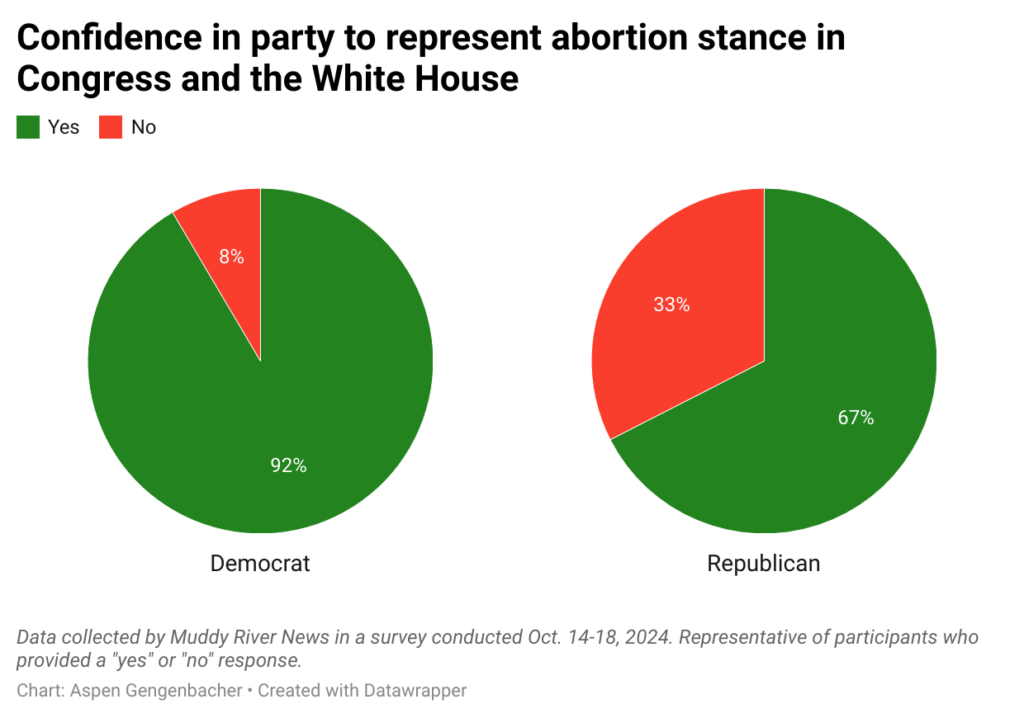
Among respondents to the MRN survey who said they identify with the Democratic and Republican parties, a larger share of Republican voters (33%) than Democratic voters (8%) indicated they do not have confidence in their party to represent their stance on abortion in Congress and the White House.
“Anybody seeking re-election (is) obviously going to say what they think is appropriate to get re-elected,” said survey respondent Justin Haubrich, who lives in Adams County.
Abortion treated as ‘a political football’ by politicians
“There are a few issues on either side of the aisle that seem to be perennial,” Haubrich said. “You don’t see a lot of movement because they need that for the next election cycle … It’s just something they use as a political football.”
Haubrich is on the anti-abortion side of the argument. He’s part of the 61 percent of men in Adams County in the MRN survey who approve of the overturning of Roe v. Wade. He believes the issue is one of morality, not politics.
“(Abortion-rights advocates) are holding a blindfold in front of themselves willingly and not admitting that you’re not talking about just the life of the mother carrying that baby,” he said. “There’s another person to be considered.”
Carrie Bross, by contrast, is part of the 56% of women in Adams County who participated in the MRN survey and disapprove of the overturning. Bross is the leader of the abortion-rights group Voices for Choice, which consists of members from west-central Illinois and northeast Missouri. Bross also believes the issue shouldn’t be political because she considers it a matter of healthcare.
“You’ve got one side saying, ‘Oh, we’re gonna work on bringing your reproductive rights back,’ and the other side saying, ‘I’m happy we got rid of your rights,’” Bross said. “They’re making it a partisan issue. It should be essential medical care. Healthcare as a whole should never be a government policy.”
Instances of medical emergencies are “the only moral justification” to Haubrich, but he believes those instances are “so statistically irrelevant that it doesn’t do any good … to talk about.”
Roughly 12% of abortions occur for “health-related reasons,” according to a 2013 study called the Turnaway Study, an ongoing, five-year, longitudinal report evaluating the health and socioeconomic consequences of receiving or being denied an abortion in the U.S.
Nearly one in four respondents to the MRN survey indicated they believed the procedure was never medically necessary. Of those, an overwhelming majority (96%) approve of the overturning of Roe.
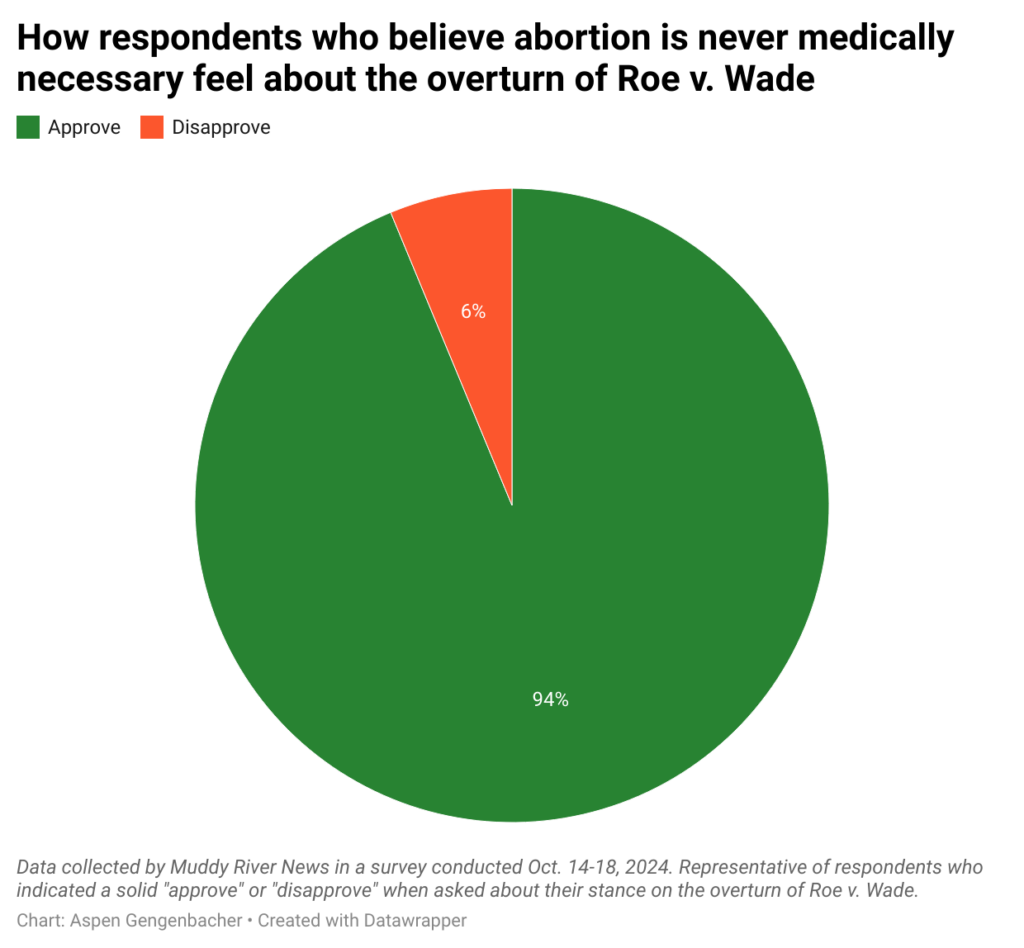
Is abortion ever really medically necessary?
If Jake Reed, president of Right to Life Adams County and an alderman on the Quincy City Council representing the 6th Ward, “had the magic wand,” he’d eliminate abortion entirely throughout the country — with no exceptions.
He’s not sold on the argument that the procedure could ever be considered medically necessary. He acknowledged the potential for complications to arise throughout pregnancy, but he believes C-sections are the answer to them.
“Get the baby out there … The baby may pass away, but I think that’s always the best idea,” he said. “Generally, most hospitals now, at least here, are very good. They’re clean, and a Cesarean section is a lot less deadly or complicated now that we have advances in modern technology and modern medicine and stuff.”
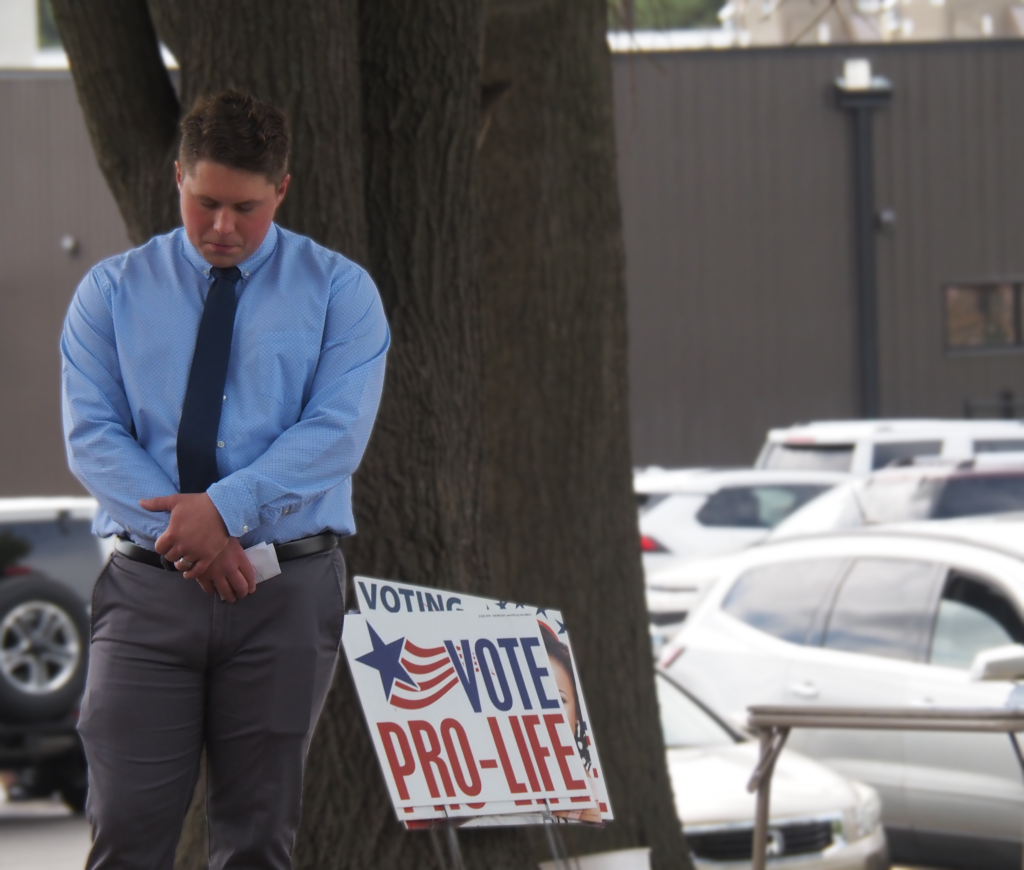
Dr. Nisha Verma, a senior advisor of reproductive health policy and advocacy at the American College of Obstetricians and Gynecologists and Fellow of the American Congress of Obstetricians and Gynecologists, said the solution isn’t that simple.
“Forcing people into major abdominal surgery is not an acceptable alternative to abortion care,” Verma said in an emailed statement. “Cesarean section is a major surgery that carries a greater risk to the patient compared to dilation and curettage or evacuation procedures and often involves lengthy and sometimes painful recovery.”
Despite major medical advancements over the last century, childbirth still has the potential to be dangerous. According to the CIA World Factbook, the maternal mortality rate in the United States is more than twice as high as rates of the United Kingdom, United Arab Emirates, France and South Korea.
Independent, non-profit media organization ProPublica has released the stories of three women — Amber Thurman, Candi Miller and Josseli Barnica — who died as a result of abortion restrictions in their states. The stories were released as part of ProPublica’s investigative series “Life of the Mother,” which seeks to explore “how abortion bans lead to preventable deaths.”
Attempts were made to schedule interviews with local OB-GYNs and midwives to get their expertise on the matter, but representatives from Quincy Medical Group and Blessing Health System declined to participate. No further comments were given.
The politicization and general discourse surrounding the issue have made it difficult for many people, especially those in women’s healthcare, to say anything about abortion on a public platform — regardless of whether it’s a topic they’re qualified to speak on.
“Even in states where abortion remains legal, some of my fellow OB-GYNs do not feel comfortable speaking out about abortion either due to threats of violence from the public or fear of consequences from their institutions,” Verma said.
‘Misinformation about healthcare is dangerous’
Verma said misinformation spewed by politicians and propagated throughout online forums has ramped up since Roe v. Wade’s overturn.
“This misinformation and these myths can prevent people from seeking needed healthcare, make people falsely believe that care isn’t available to them or even result in violence against those who provide abortion care or those who seek it out,” Verma said. “Simply put, misinformation about reproductive health care is dangerous.”
In addition to misinformation surrounding the medical necessity of the procedure in some circumstances, claims have been made that babies are being executed after they’re born in some states. Trump made such a claim during a May rally in Florida.
“I actually think it is happening,” said Kathy Obert, a “pro-life” advocate from Adams County. “I saw the movie ‘Gosnell,’ right? … I think it’s hidden, but it’s happening.”
The movie Obert referenced told the story of Kermit Gosnell, a former abortion provider who was arrested and charged with “murder, infanticide, conspiracy, abortion at 24 or more weeks and other charges” in 2011. He was given three life sentences in 2013 with no possibility of parole. The Guardian wrote that prosecutors in the case said Gosnell’s clinic was a “‘pill mill’ for addicts by day and an ‘abortion mill’ by night.”
A 2007 article published in World Psychiatry stated that “Infanticide is child murder in the first year of life. The term neonaticide was coined … to describe the murder of an infant within the first 24 hours of life.”
Infanticide and abortion are not the same thing. Infanticide is a type of homicide and is illegal in all 50 states; abortion-rights advocates do not advocate for infanticide.
Data from the CDC indicated the infanticide rate among births that occurred between 2017 and 2020 was 7.11 out of 100,000 births.
The Born-Alive Infants Protection Act added the term ‘“born-alive infant” when “determining the meaning of any Act of Congress, or of any ruling, regulation, or interpretation of the various administrative bureaus and agencies of the United States.” The law protects all infants from the moment they’re born, regardless of if their birth “occurs as a result of natural or induced labor, cesarean section or induced abortion.” It was signed into law by George W. Bush in 2002 after passing through the U.S. Senate with unanimous consent.
The American College of Gynecologists and Obstetricians (ACOG) says the phrase “late-term abortion” has no clinical or medical significance. “Term” historically referred to the three weeks before and two weeks after a pregnancy’s due date. Abortions do not happen during this period, the ACOG said.
The most recent data on abortion from the CDC indicates that eight out of 10 abortions were performed at or before nine weeks gestation. More than nine out of 10 abortions were performed at or before 13 weeks.
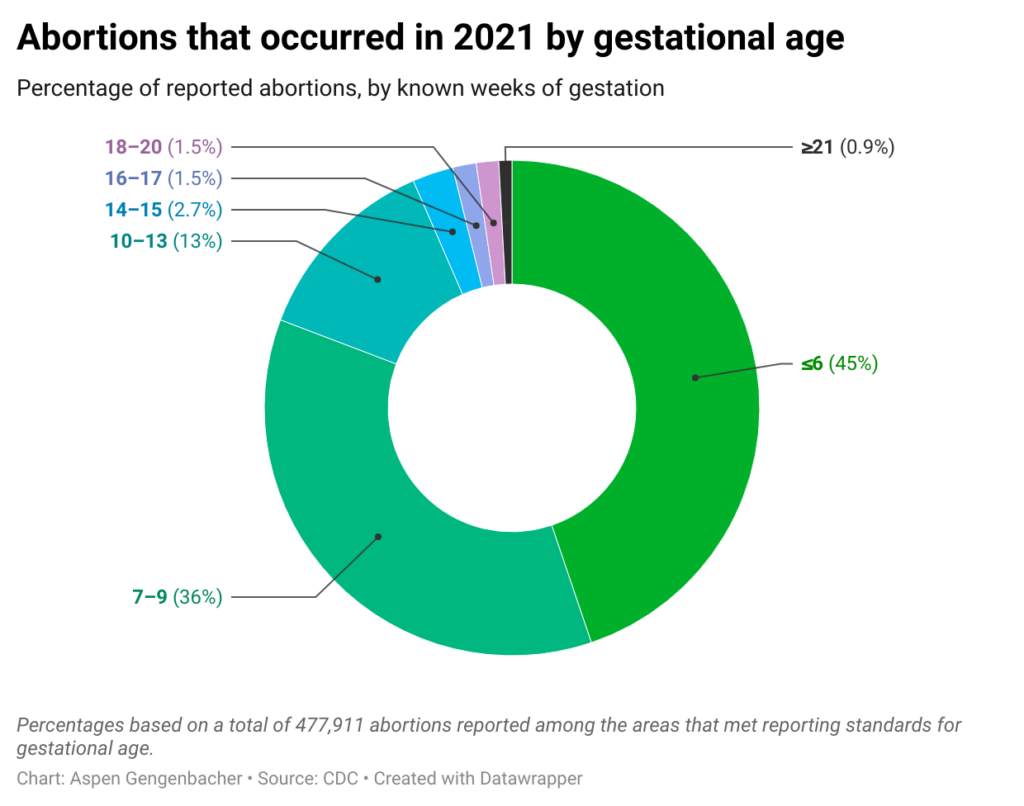
A 2023 study by the Texas Policy Evaluation Project found several instances of delayed abortion care as a result of strict abortion bans in the states patients sought them out in, resulting in abortions that occurred at later gestational periods. Patients had to travel out of state to obtain their procedures, which “was logistically complicated and expensive.”
Delays were further exacerbated for patients with unexpectedly “medically complex” conditions, as was the case with one woman who didn’t have time to extend her visit to see a specialist because she had to catch her flight back home. If gone untreated, her condition would result in an “even more complicated” treatment plan than if she had seen a specialist at her original appointment.
Even without travel-related barriers, clinics in states where the procedure is still legal haven’t seen patients as quickly due to the increased volume.
“Planned Parenthood of Illinois has seen a 200 percent increase in AB patients coming from Missouri since the Supreme Court overturned Roe v. Wade in 2022,” MJ Maharry, a spokesperson for the organization, said in an emailed statement.
An abortion story
The CDC says nearly six in 10 women (59.7%) who obtained abortions in 2013 were mothers. (The percentage was 60.7% in 2021.)
Allison Huber of Quincy was one of those women. She was opposed to abortion for “almost entirely religious” reasons when she discovered she was pregnant for the third time in three years back in 2013.
“Real-life experience doesn’t care about your ideals, necessarily,” Huber said. “Real-life experience is a series of making the decisions you need to make to continue your life in as healthy a manner as you can.”
With a 2-year-old and a 14-month-old already in tow, she ended the pregnancy.
“An overwhelming amount of the decision that I made was with them in mind and with the resources I had to care for these two children who I had already committed to,” Huber said.
She’s had conversations about abortion in the 11 years since her own. She said a woman who’s had an abortion is often referred to in the conversation as a “monster,” “morally inferior,” “a child murderer” and that they were “going to hell.” The dialogue changes course, though, when she reveals she’s one of those women.
“They’ll be like, ‘Oh, I didn’t mean you,’” Huber said.
She believes there’s an “unhealthy drive” for women to have to explain the details of the circumstances that led to their decision to abort.
“Knowing the whole time that you’re telling them (about your abortion) that they are then going to put that into their brain and weigh whether what you said makes you valid enough, if your reasons were good enough, if they personally think that you should have been able to do what you did with your life in your situation — that’s so re-traumatizing,” she said.
A correlation exists between the way society discusses abortion and how it treats mothers and pregnant people, Huber said.
A 2019 analysis of 41 countries by the Pew Research Center found that the U.S. was the only one without any government-mandated paid parental leave for new mothers or fathers. By comparison, nine of the 41 countries mandated more than a year’s worth of paid leave. Estonia ranked first with 86 weeks.
Many parents, both new and established, have noted the rise in childcare costs during the last decade. The U.S. Department of Labor estimated that new parents in Adams County paid more than $10,000 for infant child care in 2023 in an established daycare setting, on average.
“I can understand why there’s so much fear around becoming a mom and accepting the responsibility of parenthood,” Huber said. “In a lot of ways, it’s not supported very well.”
An overall lack of support was the driving force behind Huber’s decision. She believes that had she not gotten her abortion, she and her children likely would have been stuck in a “dysfunctional home.”
Huber said her abortion allowed her to be more physically and emotionally present in her children’s lives for all the important firsts — “starting to walk, starting to run, playing games and learning songs.” It also gave her the opportunity to be the best mom she could be.
“I don’t regret my decision at all … I do think, to this day, that I made the absolute best decision for my children that I could have made, because they needed me to be present for them,” Huber said. “And I love my children.”
Adopting, fostering child is ‘big commitment’
Huber has fulfilled a maternal role for a handful of other children since her abortion — including a foster child, who stayed with her for several months late last year.
According to the Congressional Coalition on Adoption Institute, “On any given day, more than 391,000 children are living in the U.S. foster care system, and the number has been rising. More than 113,000 of these children are eligible for adoption, and they will wait, on average, almost three years for an adoptive family.”
As of September of this year, more than 18,000 children are overseen by the Illinois Department of Children & Family Services — with 226 of them living in Adams County.
After suffering through two miscarriages, Reed and his wife welcomed a healthy baby girl in 2021. He said people have criticized him for not adopting or fostering himself. He says those people didn’t understand what was going on in his life.
“They don’t necessarily know exactly what’s going on in my heart or conversations that I’m having with my wife and my family, because it’s a very big commitment as well to adopt a child — to have a child in the first place. To adopt a child and to foster a child takes a lot of research and a big commitment,” he said. “If you just go, ‘Well, I have a good heart and that’s why I want to do it,’ you can run into a lot of trouble there … When you’re thinking about having a kid, you know, you got to make sure that you’re ready.”
A 2023 data analysis found an 11% increase in children entering the foster care system in states where TRAP (Targeted Restrictions on Abortion Providers) laws were enacted. The laws were designed to restrict abortion access indirectly by establishing burdensome regulations for abortion providers, from the physical dimensions of their offices to imposing high fees on licenses.
Reed said he found “extreme purpose” in becoming a father and that it deeply impacted his personal and professional life.
Reed’s friendship and family dynamics changed as he entered the unofficial parenthood “club.” His emotional capacity deepened, his “joy level (went) way up,” his community involvement catalyzed and his ability to love extended. He said his only regret was not having children sooner.
What they wish the other side knew
Numerous issues have become increasingly polarizing and politicized in recent years, and abortion is no exception. When asked what they wanted for the other side to understand their position better, this is what the people who participated in this story said.
“I believe every life is worth living. Myself and a lot of the pro-life side, none of our beliefs stem from any vitriol or hatred towards people who have opposite opinions,” Haubrich said. “I think that that’s how it’s characterized on the pro-choice side quite a bit, like we’re wanting to control women’s bodies. That’s not the truth.
“From the pro-life side, I would like to see maybe a little more understanding as to why a pregnant mother would seek to terminate their (pregnancy) and not just blanket it with, ‘Oh, you just want to kill your baby.’ I don’t think anybody is necessarily setting out to have an abortion because they want to kill a person.”
“I wish people on the other side realized that I’m not pro-abortion,” Parsons said. “That’s not what it is at all. It’s more just having a choice … I love kids, I’m going to be a preschool teacher, but I think it really is important to have a choice.”
“I believe that, in their hearts, their opinions and their stances are something that they think they’re doing out of love,” Huber said. “But their actions do not reflect that. Their actions reflect that they are absolutely willing to walk over whoever they need to walk over to seek an ideal that is ultimately not even attainable … Everybody pretty much knows (women who have had abortions).
“If you don’t know you know those women, it’s because they’re too afraid to talk to you.”
Miss Clipping Out Stories to Save for Later?
Click the Purchase Story button below to order a print of this story. We will print it for you on matte photo paper to keep forever.

